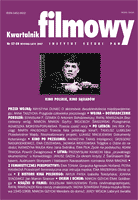Idea "prywatnego ekumenizmu" w filmach Tadeusza Konwickiego
The Idea of “Private Ecumenism" in Tadeusz Konwicki's films
Author(s): Przemysław KanieckiSubject(s): Theatre, Dance, Performing Arts
Published by: Instytut Sztuki Polskiej Akademii Nauk
Keywords: Konwicki Tadeusz
Summary/Abstract: The conciliatory message of Tadeusz Konwicki is first of all directed to the nations of Lithuania, Belarus, Russia and Poland; it was founded on the category of common identity. This article contains analyses of four films: Konwicki’s "How Far, How Near", "The Valley of the Issa", "Lava and A Chronicle of Amorous Incidents", directed by Andrzej Wajda (adaptation of Konwicki’s novel). Kaniecki argues that in these films the “ecumenical” idea is supported, among others, by the cultural diversity of the Vilnius region in the pre-war days and by the synecdoches of the region’s three great religions (Catholicism, the Orthodox Church and Judaism). Kaniecki picks out the Jewish element from Konwicki’s work to emphasize that although it’s a significant component of the author’s reflection on the Eastern borderlands, the “ecumenical” message cannot be examined as directed to the Jews as the universal sin of the shared guilt of the Holocaust requires expiation rather than reconciliation.
Journal: Kwartalnik Filmowy
- Issue Year: 2007
- Issue No: 57-58
- Page Range: 222-241
- Page Count: 20
- Language: Polish

